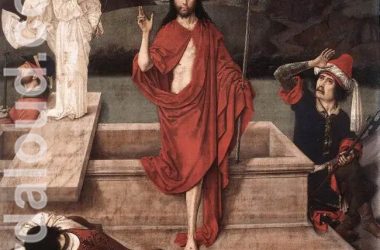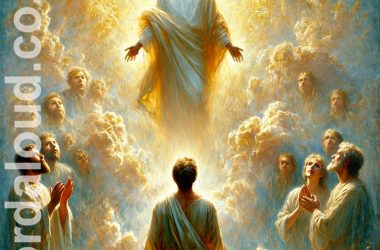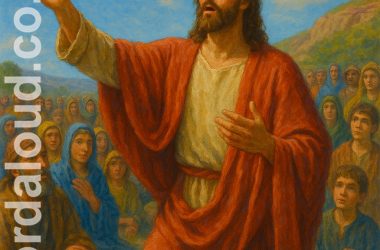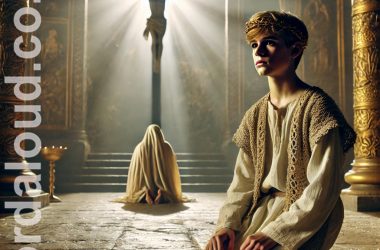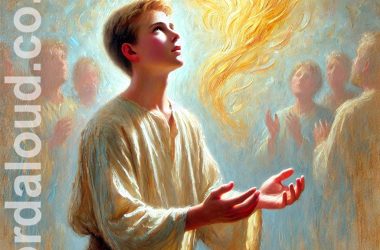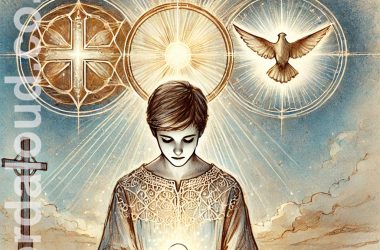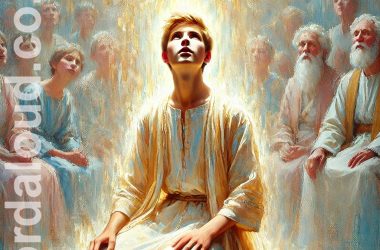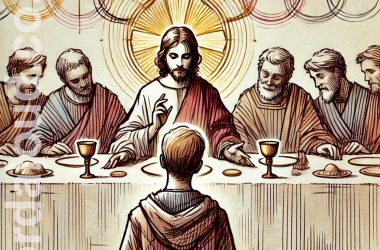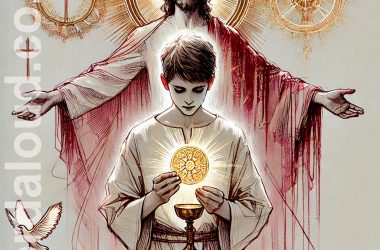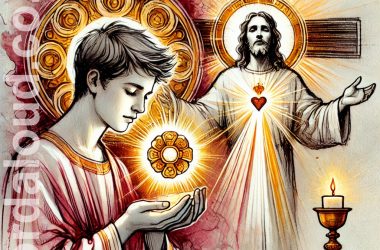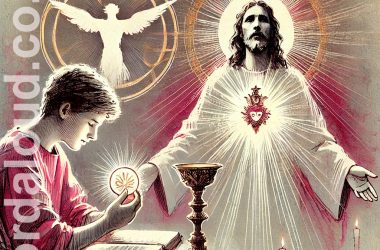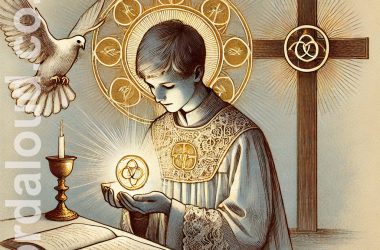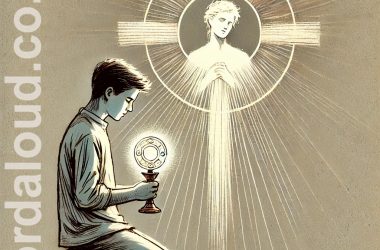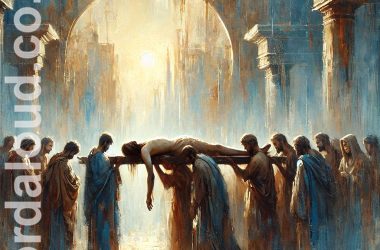Saint Cyril of Alexandria considers how the Holy Spirit is given to humanity through Christ. Saint Cyril’s central point is that the renewal of human nature is inseparable from the gift of the Spirit. Without the Spirit, humanity cannot return to the peace and stability intended by God from the beginning.[ … ]
Christian Art
Sacred beauty in image and word — an exploration of Christian art
Sacred stories told through the language of Christian art
Office Of Readings | Week 28, Wednesday, Ordinary Time | A Reading From The Discourses Of Saint Maximus The Confessor Addressed To Thalassius | The Light That Enlightens Every Man
Saint Maximus the Confessor interprets Christ’s saying about the lamp set upon a lamp stand (Matthew 5:15; Luke 8:16) as a theological statement about the Incarnation and the Church. The ‘lamp’ is Christ himself — the eternal Word of the Father, who has taken human nature and become visible within creation. The imagery unites revelation and embodiment: divine wisdom, formerly hidden, is now manifest through the humanity of Jesus [ … ]
Daily Bible Verses | Miraculous Catch Of Fish And The Calling Of The First Disciples | Fishers Of Men | King James Audio Bible KJV
Luke’s Gospel places the calling of the first disciples after the fame of Jesus has already spread across the region. Simon Peter listens to Jesus’ words, then he experiences the miraculous catch of fish, and then he throws himself down before Jesus, acknowledging his sins and placing his life in Jesus’ hands. This is Simon Peter’s call. He gives away everything he has to follow Jesus [ … ]
Office Of Readings | Week 16, Thursday, Ordinary Time | A Reading From The Discourses Of Saint Ambrose On The Psalms | Light Of God’s Countenance
Saint Ambrose’s reflection on Psalm 44 (/Vg. 43) considers what might be one of the most persistent experiences in spiritual life: the feeling that God has turned away. Rather than offer abstract consolation, Saint Ambrose interprets this experience through the lens of faith, Scripture, and theology. His aim is to show that even when God seems absent, he remains present in a real and transformative way [ … ]
Office Of Readings | Week 12, Monday, Ordinary Time | A Reading From The Treatise Of Saint Gregory Of Nyssa On Christian Perfection | The Christian Is Another Jesus Christ
Saint Gregory, one of the Cappadocian Fathers and a central figure in fourth-century theology, explores what it means to bear the name ‘Christian’. Drawing heavily from the writings of Saint Paul, he lays out a vision of spiritual transformation in which the believer becomes an ‘alter Christus’ – another Christ [ … ]
Office Of Readings | Week 11, Tuesday, Ordinary Time | A Reading From The Treatise Of Saint Cyprian On The Lord’s Prayer | Hallowed Be Thy Name
Saint Cyprian of Carthage, writing in the 3rd century during times of persecution and doctrinal unrest, offers a spiritually profound and pastorally sensitive reflection on the opening petitions of the Lord’s Prayer. His meditation on ‘Hallowed be thy name’ invites us to reflect not only on what we say in prayer, but how we live as those who call God ‘Father’ [ … ]
Office Of Readings | Eastertide Week 7, Saturday | A Reading From An Unknown African Author Of The Sixth Century | The Church In Its Unity Speaks In Every Language | The Holy Spirit At Pentecost
This remarkable 6th century reflection from an anonymous African author offers a rich theology of Pentecost, drawing together ecclesiology, pneumatology, and missiology with great pastoral clarity. Writing within the context of the post-Roman North African Church—one marked by persecution, doctrinal strife, and cultural transition—this author bears witness to a theology of hope, rooted in the enduring and unifying presence of the Holy Spirit [ … ]
Office Of Readings | Eastertide Week 7, Wednesday | A Reading From The Constitution Of The Second Vatican Council On The Church | The Mission Of The Holy Spirit
This passage from Lumen gentium, the Dogmatic Constitution on the Church promulgated at the Second Vatican Council, is a profound exposition on the life-giving, unifying and guiding presence of the Holy Spirit in the Church. It articulates not only doctrinal truths about the Spirit’s nature and mission but also gives pastoral encouragement to the faithful to discern and receive the Spirit’s activity in their lives [ … ]
Office Of Readings | Eastertide Week 7, Tuesday | A Reading From The Treatise Of Saint Basil The Great On The Holy Spirit | The Power Of The Holy Spirit Fills The Whole Universe
Saint Basil the Great’s Treatise on the Holy Spirit was written during a time of doctrinal instability when the Church faced serious challenges regarding the nature and divinity of the Holy Spirit. Basil’s work is both an affirmation of the Spirit’s divine identity and a profound meditation on the Spirit’s activity in creation, revelation and sanctification [ … ]
Daily Bible Verses Easter Season To Pentecost | Friday Week 6 | Rejoice! A Pregnant Woman’s Labour Pains Bring Her Great Joy
In the Old Testament of the Bible, the image of a woman giving birth is often used to express great pain. It is also often used, especially by the prophets, to signify the birth of the new messianic people – see, for example, Isaiah. Jesus recalls both the pain of the Old Testament and the hope and fulfilment expressed through the prophets. The new birth is imminent. Through the sorrow and pain of the crucifixion, we are called to God [ … ]
Office Of Readings | Eastertide Week 6, Tuesday | A Reading From The Commentary Of Saint Cyril Of Alexandria On Saint John’s Gospel | Jesus Christ Is The Bond Of Unity
Saint Cyril of Alexandria draws attention in this reading to the spiritual and sacramental union of believers with Christ and one another. His theology, formed during the height of the Trinitarian and Christological controversies of the fourth and fifth centuries, centres on the mystery of the Incarnation and the salvific unity it brings to humanity. This passage illustrates a core tenet of Cyril’s thinking: that through Christ’s incarnation and the indwelling of the Holy Spirit, the faithful are mystically united both with Jesus Christ and with each other [ … ]
Office Of Readings | Eastertide Week 5, Wednesday | A Reading From The Letter Of Diognetus | Christian Living | In The World, But Not Of The World | What It Means To Be Christian
Christians blend into society—they marry, raise children, dress, eat, and work like others—but they live with a radical spiritual orientation. Their true ‘citizenship is in heaven’ (Philippians 3:20), and they view life on earth as a pilgrimage. This tension between presence and detachment highlights the paradoxical nature of Christian witness: they fully engage with their society while simultaneously transcending its values [ … ]
Office Of Readings | Eastertide Week 5, Tuesday | A Reading From The Commentary Of Saint Cyril Of Alexandria On Saint John’s Gospel | Jesus Is The Vine
Christ calling himself the vine and believers branches reveals the nature of our intimate, organic union with Jesus. This image underscores not mere moral imitation, but ontological participation — we share in Christ’s own life. Cyril writes, ‘[T]hose who are joined to him, as branches are to a vine, share in his own nature.’ [ … ]
Office Of Readings | Eastertide Week 5, Monday | A Reading From The Addresses Of Saint Gregory Of Nyssa | Jesus Christ Is The First-Born Of All Creation
Saint Gregory of Nyssa, a 4th-century Cappadocian Father and key architect of early Christian theology, offers in this Eastertide reading a profound and poetic meditation on the transformative power of the Resurrection. Rooted in the joy of Easter, the sermon explores the cosmic and personal implications of Christ’s rising from the dead. Gregory’s theology is deeply mystical, sacramental, and steeped in scriptural imagery, and this piece reveals the vast scope of the Christian vision of renewal [ … ]
Office Of Readings | Eastertide Week 5, Sunday | A Reading From The Sermons Of Saint Maximus Of Turin | Jesus Christ Is The Day
The sermon begins with a triumphant proclamation: ‘Christ is risen! He has burst open the gates of hell and let the dead go free.’ This dramatic image immediately places the Resurrection within the context of the Harrowing of Hell, a traditional doctrine in early Christianity that sees Christ descending into the realm of the dead to liberate the righteous. The Resurrection is not limited to the physical body of Jesus—it triggers a universal release and upward movement: the dead rise, the Church is renewed through baptism, and the doors of heaven are opened [ … ]
Office Of Readings | Eastertide Week 4, Saturday | A Reading From The Commentary Of Saint Cyril Of Alexandria On The Letter To The Romans | All Are Saved Through Jesus | Opus Dei | Body Of Jesus Christ
This reflection, drawn from Saint Cyril of Alexandria’s commentary on the Letter to the Romans, richly develops the theological significance of unity, divine mercy, and the universality of salvation. The passage resonates deeply with themes central to Eastertide: renewal, reconciliation, and the triumph of divine love through the risen Christ. St Cyril, a towering figure in patristic theology and a staunch defender of orthodoxy at the Council of Ephesus, here offers a profound meditation on the body of Christ and the universal scope of redemption [ … ]
Office Of Readings | Eastertide Week 4, Friday | A Reading From The Letter Of Pope Saint Clement I To The Corinthians
The First Letter of Clement is one of the earliest post-New Testament Christian writings, dating to around 95 A.D. Clement was the third successor of Saint Peter as Bishop of Rome, and his letter was written to address a crisis in the Corinthian church, where a group of younger Christians had ousted their elders from leadership. Clement’s primary aim was to restore harmony and proper ecclesial order. Against this background, his call for unity, humility, and order takes on profound urgency [ … ]
Office Of Readings | Eastertide Week 4, Wednesday | A Reading From The Treatise Of Saint Hilary Of Poitiers On The Trinity
Saint Hilary of Poitiers (c. 310–367) was a bishop and doctor of the Church known primarily for his role in defending the Nicene faith against Arianism. This heresy denied the full divinity of Christ and therefore threatened the entire theological foundation of the Incarnation, Trinity, and Eucharist. In his principal theological work, De Trinitate (‘On the Trinity’), Hilary argues forcefully for the unity of the divine and human in Christ. The Eucharistic theology expressed in this passage reflects and supports that Christological argument [ … ]
Office Of Readings | Eastertide Week 4, Monday | A Reading From The Treatise Of Saint Basil The Great On The Holy Spirit | The Spirit Gives Life
Saint Basil the Great’s reflection on baptism and the Holy Spirit is grounded in the rich theological and liturgical tradition of the fourth-century Church, when the doctrine of the Holy Spirit was under fierce debate. Writing against those who denied the divinity of the Spirit (notably the Pneumatomachians), Basil’s On the Holy Spirit defends the Spirit’s full equality with the Father and the Son. In this passage, he focuses on baptism as the sacrament by which the believer enters into new life, through the cooperation of both water and Spirit [ … ]
Office Of Readings | Eastertide Week 3, Saturday | A Reading From The Commentary Of Saint Cyril Of Alexandria On Saint John’s Gospel | Jesus Christ Gave His Body For The Life Of All
Saint Cyril of Alexandria (c. 376–444), Patriarch of Alexandria and central figure in early Christological controversies, here articulates a robust theology of redemption grounded in the Incarnation and its sacramental outworking. Writing in the context of his conflict with Nestorius and the doctrinal developments that led to the Council of Ephesus (431), Cyril is concerned above all with affirming the unity of Christ’s divine and human natures, and the salvific power of that union. This excerpt reflects his mature theological vision, especially his emphasis on the death of Christ as the decisive means of defeating death and giving life to humanity through participation in his now-glorified body [ … ]
Office Of Readings | Easter Monday | A Reading From The Homily Of Melito Of Sardis On The Pasch | Praise Of Jesus Christ
Melito of Sardis, writing in the second century, gives us one of the earliest and most powerful reflections on the mystery of Easter. His homily, poetic and theological, offers not just a celebration of the resurrection but a sweeping vision of salvation history fulfilled in Jesus Christ. The tone is triumphant and exultant—fitting for the season of Easter—but the substance is rich with meaning. At its heart, the homily proclaims a profound truth: that in Christ, death is not the end, but the beginning of new and eternal life [ … ]
Office Of Readings | Holy Saturday | A Reading From An Ancient Homily For Holy Saturday | Harrowing Of Hell
Holy Saturday is unlike any other day in the liturgical year. It is a day suspended between death and life, darkness and light, silence and song. This ancient homily for Holy Saturday enters deeply into that liminal space—the moment when Christ, having died on the cross, descends to the realm of the dead. In doing so, it invites us into the mystery of the Harrowing of Hell: Christ’s triumphant entry into the underworld to liberate those held captive by death since the dawn of time [ … ]
Office Of Readings | Good Friday | A Reading From The Instructions Of Saint John Chrysostom To Catechumens
In this deeply moving catechesis, St. John Chrysostom leads us into the mystery of Christ’s Passion, focusing our attention on the extraordinary power and significance of his blood. For Chrysostom, this blood is not just a historical detail or a symbol of suffering—it is life itself. It is protection, healing, rebirth, and nourishment. It is the very source from which the Church is born [ … ]
Office Of Readings | Thursday Of Holy Week | Maundy Thursday | A Reading From The Homily Of Saint Melito Of Sardis On The Pasch
On Holy Thursday, the Church gathers to remember the Last Supper—the evening when Jesus, in a quiet upper room, gave his friends the gift of the Eucharist, and with it, a new covenant sealed in his blood. The reading from Saint Melito of Sardis, a bishop from the second century, helps us understand the deeper meaning of what took place that night and how it connects to the cross and the resurrection that followed [ … ]
Office Of Readings | Wednesday, Lent Week 2 | From The Treatise Against Heresies By Saint Irenaeus, Bishop
In this passage from Against the Heresies, Saint Irenaeus presents a sweeping vision of salvation history, showing how God, from the very beginning, has been preparing humanity for full communion with God. Central to Irenaeus’ theology is the idea that divine pedagogy unfolds in stages, accommodating human weakness while always pointing toward Christ. Through the law, the prophets, and acts of providence, God was training his people, drawing them from earthly concerns to heavenly realities [ … ]
King David And The Coming Of Jesus Christ | The Gospel | A Boy King David Declares The Gospel | Christian Faith | Audio Bible
Like and share this collection of videos on YouTube. Each video features a young King David in the Temple, proclaiming the Gospel. Each is a striking reminder of deep connection between Jewish history, King David, and the coming of the Lord Jesus Christ. The boy king is clothed as an initiate, recalling the Gospel account of Jesus in the Garden of Gethsemane [ … ]
Christian Gifts Of Martyrdom | Prayer With Jesus In The Garden Of Gethsemane | King James Audio Bible | KJV
Jesus promises his disciples that they shall be persecuted. It is an extraordinary knowledge to impose. We might wonder at the courage and bravery inspired by Jesus in these most early Christians to witness Jesus Christ and to be the first Christian Church. Gradually, through his time with his disciples, Jesus teaches his disciples to anticipate and to understand the crucifixion – the Christian Cross [ … ]
Pentecost | Birthday Of The Church | Descent Of The Holy Spirit | Tongues Of Fire | Audio KJV Bible
Pentecost is celebrated 50 days after Easter Sunday. It is considered the birth of the Church and marks the descent of the Holy Spirit upon the apostles and other followers of Jesus Christ. The Bible tells us that the Holy Spirit descended upon the apostles in the form of tongues of fire, and they were able to speak in multiple languages, allowing them to spread the message of Jesus to a wider audience [ … ]


